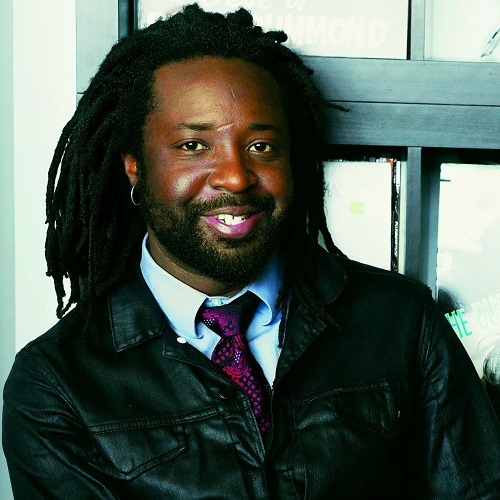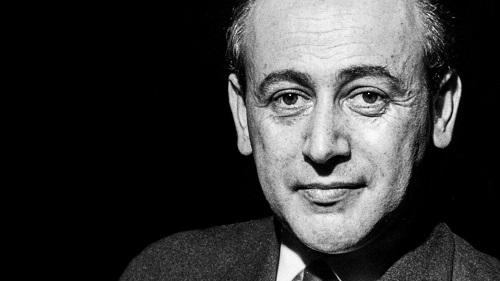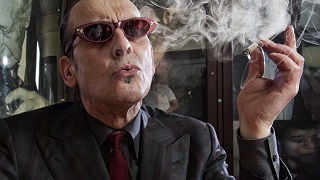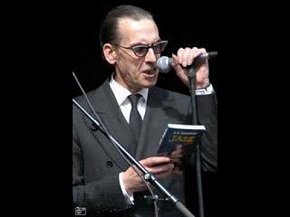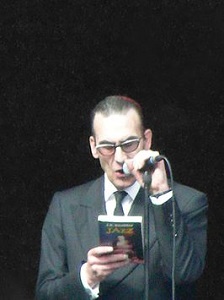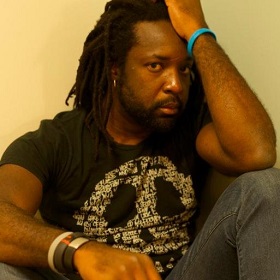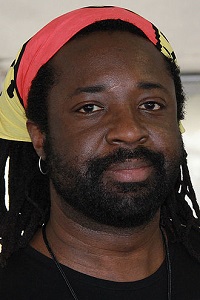De Nederlandse dichter en schrijver Jules Deelder werd geboren op 24 november 1944 te Rotterdam, in de wijk Overschie. Zie ook alle tags voor Jules Deelder op dit blog.
Der Untergang des Abendlandes
gezeten in het hemelsblauwe bad
neemt hij nadenkend de grote
zilveren zonnebril af en staart
door de kleine gouden zonnebril
die hij daaronder blijkt te dragen
naar de prehistoriese loopvogel
die aan het voeteneind
verschenen is
en terwijl hij stilaan vervliegt
tot een gas van onbekende
samenstelling
welt uit z’n kristallen keel
nog koel
de Waanzinsaria
– kijk eens in
m’n reet of
het theewater
kookt
een veelkleurige hagedis
verlaat vervolgens geruisloos
z’n navel
Enquête
opengereten in de Final Blast
gekookte hersens op je wangen?
verkoold verkruimeld weggesmolten
In Verzengende Winden?
of
langzaam leeggezogen
met een gebarsten leesbril
achter een krant van jaren her
rottend in een ziekenhuis
de bleke middagzon in je verschoten ogen
kraaiend boven een prentbriefkaartenverzameling
een zakje onder het hart voor de ontlasting
pratend over de paardetrem tegen een opgezette parkiet
bloedend op de overloop
na een week pas ontdekt
omdat de melk alsmaar blijft staan?
is dat dan de ideale staat to meet Thy Maker?!
is dit dan de Doem van Doodskoppenland?!
Kunst
‘Wie van de aanwezigen
houdt er van kunst?’
‘Ikke.’
‘Prachtig! Dan kunt u
mij vast wel even helpen
met het ophangen van de
schilderijen.’
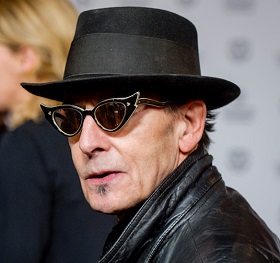
Jules Deelder (Rotterdam, 24 november 1944)
De Nederlandse schrijfster Wanda Reisel werd geboren in Willemstad (Curaçao) op 24 november 1955. Zie ook alle tags voor Wanda Reisel op dit blog.
Uit: Plattegrond van een jeugd
“Hier begint het: Amsterdam, Van Eeghenstraat 100, vijf verdiepingen, zestien kamers, zesentwintig vaste kasten. Kolenhok en prieel in de tuin, grenzend aan het Vondelpark.
Maar wat begint er eigenlijk? Wat er om je heen en met je gebeurt, wat er over je en aan je verteld wordt, alles wat je van horen zeggen hebt, dat alles zijn draden familiegeschiedenis, vergeelde fotoboeken, dozen vol dia’s en 8 mm-films, een web van vroegere anekdotes en die welke nog wekelijks opduiken uit het brein van een bejaarde tante of oom, de verbindingen daartussen en het beeld dat jij ervan maakt… Dat gebruik je om het verhaal van je eigen leven op te tuigen. Ja, jij ook. Want zeg nu eerlijk: jou is het toch ook maar verteld?
Het leven van horen zeggen, dat kennelijk het mijne is, begint eerst ver weg met mijn geboorte in de West. Ik heb liefhebbende, fotograferende en filmende ouders. Mijn moeder, die graag met schaar en Lerolijm in de weer is en toegewijd baby’s en babyboeken produceert, schrijft bij de foto’s uitgebreide onderschriften: ‘Kralen rijgen met grote houten kralen vind je leuk, maar niet te lang. Dan ga je ermee gooien. Net zo is het met tekenen. Je krabbelt wat op een papiertje, maar als ik niet oplet, zit even later alle ballpoint of potlood op deuren en muren. De meeste mensen zeg je uit jezelf goedendag. Speciaal de gekleurde bevolking bejegen je erg vriendelijk.’
Maar hier, in deze straat met bomen, begint het voor mij pas echt. Het is zomer en ik ben vijf jaar. Voor het huis staan de twee kratten zo groot als een kamer, waaruit een berg verse houtwol komt met daarachter verstopt meubels, schilderijen, lampen, beelden (waarvan één gebroken). Wij, mijn vriendje Mario en andere kinderen uit de buurt, staan er met onze fietsjes bij. Ik ben opgewonden want die grote kisten, die zo’n bekijks trekken, zijn van ons en wat erin verstopt zit, zijn onze spullen, die nu onbeschut op straat staan. Ik ben dus een van de hoofdpersonen van deze gebeurtenis, maar in wezen ben ik net zo benieuwd als de buurtkinderen, want ook ik weet niet wat er tevoorschijn zal komen. De spullen zijn misschien wel een jaar of langer geleden ingepakt en nu pas afgeleverd. Hoe die kratten hier zijn neer geplant, vraag ik me niet af. De dingen zijn er, dat is genoeg. Ik weet niet of ik ze nog herken, maar ze horen bij ons. En straks, als ze een plek hebben, bij het huis.
Kom maar wat dichterbij, dan hoef ik niet zo hard te praten. Gek dat ik niet weet wat dit voor bomen zijn. Ik heb geen verstand van de natuur. Ik woon hier vanaf mijn kleutertijd tot en met mijn achttiende jaar.”
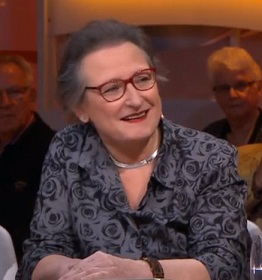
Wanda Reisel (Willemstad, 24 november 1955)
De Jamaicaanse schrijver Marlon James werd geboren op 24 november 1970 in Kingston, Jamaica. Zie ook alle tags voor Marlon James op dit blog.
Uit: A Brief History of Seven Killings
“Listen.
Living people wait and see because they fool themselves that they have time. Dead people see and wait. I once asked my Sunday school teacher, if heaven is the place of eternal life, and hell is the opposite of heaven, what does that make hell? A place for dirty little red boys like you, she said. She’s still alive. I see her, at the Eventide Old Folks Home getting too old and too stupid, not knowing her name and talking in so soft a rasp that nobody can hear that she’s scared of nightfall because that’s when the rats come for her good toes. I see more than that. Look hard enough or maybe just to the left and you see a country that was the same as I left it. It never changes, whenever I’m around people they are exactly as I had left them, aging making no difference.
The man who was father of a nation, father to me more than my own, cried like a sudden widow when he heard I had died. You never know when people’s dreams are connected to you before you’re gone and then there’s nothing to do, but watch them die in a different way, slow, limb by limb, system by system. Heart condition, diabetes, slow-killing diseases with slow-sounding names. This is the body going over to death with impatience, one part at a time. He will live to see them make him a national hero and he will die the only person thinking he had failed. That’s what happens when you personify hopes and dreams in one person. He becomes nothing more than a literary device.
This is a story of several killings, of boys who meant nothing to a world still spinning, but each of them as they pass me carry the sweet-stink scent of the man that killed me.
The first, he screams his tonsils out but the scream stops right at the gate of his teeth because they have gagged him and it tastes like vomit and stone. And someone has tied his hands tight behind his back but they feel loose because all the skin has rubbed off and blood is greasing the rope. He’s kicking with both legs because right is tied to left, kicking the dirt rising five feet, then six, and he cannot stand because it’s raining mud and dirt and dust to dust and rocks. One rock claps his nose and another bullets his eye and it’s erupting and he’s screaming but the scream runs right to the tip of his mouth then back down like reflux and the dirt is a flood that’s rising and rising and he cannot see his toes. Then he’ll wake up and he’s still dead and he won’t tell me his name.”
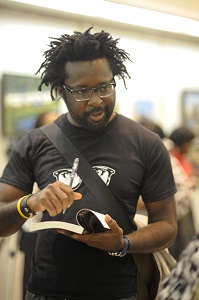
Marlon James (Kingston, 24 november 1970)
De IJslandse schrijver Einar Kárason werd op 24 november 1955 geboren in Reykjavík. Zie ook alle tags voor Einar Kárason op dit blog.
Uit: Feindesland (Vertaald door Helmut Lugmayr)
„Ich hatte bei ihm zu Hause in Reykholt viele Kostbarkeiten gesehen, die er aus den Händen des Königs oder von Fürsten empfangen hatte: Gold und wertvolle Kleinodien als Lohn für seine Dichtung und die Treue zu seinen Verwandten unter den norwegischen Herrscherfamilien. Und so glaubte ich, als ich vor einigen Wintern hierher kam, es würde reichen, Snorris Namen zu nennen und zu sagen, dass ich sein Neffe sei, um sogleich mit offenen Armen aufgenommen zu werden.
Ich hatte mir als Kind immer ausgemalt, wie Snorri an den Königshof kam und ihm eine Schar fürstlich gekleideter Männer entgegenging, die ihn vor den König geleiteten, während das ganze Volk in Respekt und Bewunderung das Haupt vor diesem großartigen Mann neigte.
Aber das waren natürlich nichts als Hirngespinste und lächerliche Kindereien. Denn in Norwegen betrachtet man Snorri Sturluson auch nur als gewöhnlichen isländischen Bauernlümmel. Als einen dieser sonderbaren, vom Wind zerzausten Isländer, über die man sich vielleicht noch lustig machen kann und die man bei Geschäften gerne über den Tisch zieht. Die Leute hier wissen nämlich, dass die Isländer am liebsten mit Geld um sich werfen und weder handeln noch feilschen – denn das ist nur die Sitte von Habenichtsen.
Man lässt sie deshalb für alles den doppelten Preis bezahlen, was sie auch freudig und mit stolzgeschwellter Brust tun. Hinterher lachen sich die Einheimischen ins Fäustchen, wenn sie ihr Geld zählen.
Ich habe meinen Onkel Snorri einmal getroffen, seit ich hierher nach Norwegen kam. Man hatte mich mit ein paar anderen im Auftrag des Königs nach Bergen gesandt – es war eine belanglose Mission und das Anliegen völlig unbedeutend. Dort angekommen begann ich, unter den Leuten am Hof von Skúli Jarl nach Snorri zu fragen. Immerhin, die meisten kannten ihn – lächelten bei dem Gedanken an ihn. »Ja, der Dichter!«, sagten sie. Nein, sie wüssten nicht, wo er sich aufhielte. »Sieh aber heute Abend in der Schenke nach!« Ich kenne solche Orte, man kann dort Bier und Met kaufen, und dahin ging ich am Abend – wäre ohnedies hingegangen …“
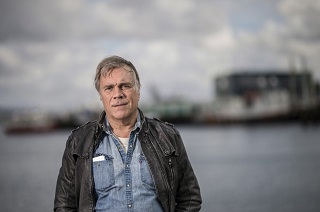
Einar Kárason (Reykjavík, 24 november 1955)
De Ivoriaanse schrijver Ahmadou Kourouma werd geboren op 24 november 1927 in Togobala. Zie ook alle tags voor Ahmadou Kourouma op dit blog.
Uit: Allah Is Not Obliged (Vertaald door Frank Wynne)
“I was running around on all fours and maman was chasing me. I was going faster than she was. She was chasing after me, her right leg stuck up in the air, moving on her arse in fits and starts, leaning on her arms. I went too far, too fast, ‘cos I was trying not to get caught. I made a dash and fell on to the glowing embers.The fire did its job and grilled my arm. It grilled the arm of a poor little kid because Allah doesn’t have to be fair about everything he does here on earth. I still have the scar, on my arm, in my head, in my belly like the Black Africans say, and in my heart. It’s still there in my heart, in my whole being, like the smell of my mother. My body is saturated with maman’s nauseating smell. (According to the Larousse,’nauseating’ means ‘capable of arousing aversion or disgust’ and ‘saturated’ means ‘drenched or soaked with liquid’.)Gnamokode!Anyway, even back when I was a cute kid, back in my childhood, there was this ulcer eating into maman’s right leg and rotting it. An ulcer that steered my mother (to ‘steer’ is ’to guide someone somewhere’).An ulcer that steered my mother and the rest of the family. And, around my mother and her ulcer was the hearth. The hearth that grilled my arm. The hearth always belching smoke or sparks; it spits sparks when you poke the fire to get it going. All round the hearth there were kanaris (according to the Glossary,a kanaris is a handcrafted earthenware jar). There were kanaris and more kanaris, and every one of them filled with decoctions (that means liquid obtained from the action of boiling plants).The decoctions were used for flushing maman’s ulcer.There were more kanaris lined up along the wall at the back of the hut. Between the kanaris and the hearth, there was my mother and her ulcer wrapped up in a pagne. There was me, and there was the marabout, hunter and healer, Balla. Balla was maman’s healer.Balla was a great guy and totally extraordinary. He knew all these countries and other stuff. Allah had given him hundreds of incredible destinies, and talents and opportunities. He was a freedman – according to Larousse, that’s what they called someone who used to be a slave but is now free. And he was a donson ba, that’s the name we give to a master huntsman who has killed black game and at least one malevolent djinn, according to the Glossary. Balla was a kaffir – that’s what you call someone who refuses to believe in Islam and keeps his grigris. (According to the Glossary, a ‘grigri’ is ‘a protective amulet, often a piece of paper inscribed with magical incantation kept in a small leather purse which is tied above the elbow or around the neck’.) Balla refused to burn his false idols, so he wasn’t a Muslim, he didn’t perform the five daily prayers, or fast for one month every year.”
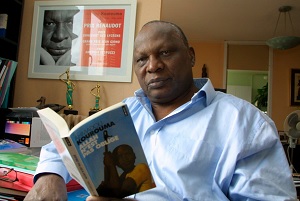
Ahmadou Kourouma (24 november 1927 – 11 december 2003)
De Amerikaanse schrijver Thomas Kohnstamm werd geboren in Seattle, Washington op 24 november 1975. Zie ook alle tags voor Thomas Kohnstamm op dit blog.
Uit: Do Travel Writers Go to Hell?
“I mistakenly thought that having an MA would open some doors, but I couldn’t even get a callback from office temp agencies. In early 2002, I washed up as a retail employee at Club Monaco—a slightly fancier version of the Gap—up on 5th Av-enue and 55th Street in the middle of Manhattan. Even better, I was assigned to the women’s dressing room. A key part of my job was to ask female customers if they needed a smaller size. If they came back to the dressing room with a size 6, I’d ask “Are you sure that I can’t grab you a 4?” If they came back with a 4, I’d ask about a 2. It was just that simple. One day, while I was expertly folding jeans and fitted T-shirts, the assistant store manager, a Jersey boy with LA hair and a fake tan, asked me, “Do you think that you’ll ever get your act together and go to college?” “I have a master’s from Stanford and started a DPhil at the London School of Economics,” I answered and went on folding. “Yeah right, man. There isn’t even such a thing as a dee fill.
You should really try a jay cee instead. It helped me to get this job,” he stated with the resolute authority of a Club Monaco assistant manager. I told him that I would consider it.
Every boom is followed by a bust and, in America, someone will always find a way to make money off of the bust—most likely lawyers. When I heard that a Wall Street firm was hiring re-searchers to work on high-profile, undisclosed cases, I was so eager to get out of retail that I didn’t slow down enough to really understand what the job entailed. I was told only that they represented, among other concerns, a little-known firm called Cerberus Capital Management that was buying up dis-tressed debt. The fact that the company was named after the three-headed guardian clog of I-lades and that the papers re-ferred to distressed debt as “vulture investing” did not raise any red flags. I was racing toward thirty and most of the once-wide-open doors of opportunity had already slammed in my face. Maybe it was time to take the LSAT or the GMAT and get on with forg-ing a dependable career. These were the new realities. Law seemed respectable enough: something to use your brain, make a solid income; something that I could be proud of at col-lege reunions. Once hired, I worked with Cerberus on a couple of cases, but I specialized in the assorted legal problems of a once-prominent research analyst who had been the foremost opin-ion on telecommunications companies, most notably World-Corn. Research analysts are supposed to give unbiased opinion to the public on which stocks were worth buying. But during the telecom bubble, some analysts just worked hand in hand with the bankers and the telecom CEOs to promote the companies.”
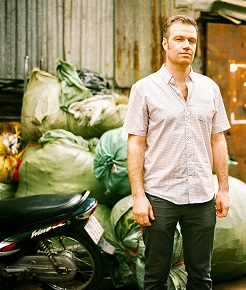
Thomas Kohnstamm (Seattle, 24 november 1975)
De Nederlandse schrijver van Marokkaanse afkomst Hans Sahar (pseudoniem van Farid Boukakar) werd geboren in Al Hoceima, Marokko, op 24 november 1974. Zie ook alle tags voor Hans Sahar op dit blog.
Uit: Zoveel liefde
‘Hou je van gabberhouse? Dan zit je hier goed.’ Dat was het enige wat de jongen had gezegd van wie Rash de kamer had overgenomen, de huisbaas had niks verteld over de andere huurders, alleen dat het er vijf waren en dat ze de keuken en de douche deelden. Het kon Rash niet veel schelen dat er naast hem een gabber zat, want zijn eigen rap en trance draaide hij ook niet echt zachtjes.
Hij was benieuwd hoe het zou gaan, voor het eerst van zijn leven was hij op kamers. Op kamers! Deze ene kale ruimte met een bed, een tafel en twee stoelen. Hij had een paar posters op de muur geprikt van Public Enemy en om zich heen staan kijken van: dit is dan het nieuwe begin, eindelijk vrij, zelfstandig, niet meer dat eeuwige gezeik thuis van pa, van de kinderen met al hun problemen waar hij altijd voor op moest draaien, vrij!
Maar hij voelde ook dat andere, waar hij de laatste nachten thuis wakker van had gelegen: alleen, alleen, zonder iemand, terwijl hij altijd in een huis vol drukte en mensen had gezeten, waar je alles met iedereen deelde.
Het waren bloedhete en benauwde dagen in september. Het raam van de kamer moest je met veel gekraak en gepiep omhoogtrekken en dan bleef het hangen aan halfvergane touwen. De eerste keer dat hij het deed, zag hij beneden op de hoek van de Ruysdaelstraat een jongetje, dat schrok van die herrie en omhoog keek maar toch zijn werk afmaakte: het slot forceren van de fiets die aan de lantaarnpaal vastzat. Rash kende de Schilderswijk goed genoeg om te weten dat het niks bijzonders was. Maar toch bleef het een tijdje door zijn kop spelen, niet dat het hier een crimineel zootje was – wat maakte dat hem uit – maar dat iedereen alleen met zichzelf bezig is.
Hij had de jongen even nagekeken toen hij op de fiets sprong en om de hoek verdween. Weg. Zo flits je hierheen en daarheen en je bent bezig met je eigen dingen. Zo’n fiets. Verkopen. Een paar tientjes. Geld opmaken. Verder maar weer. Maar zo’n leventje was niks voor Rash. Kleine criminaliteit is té klein. De rotmoeite niet. Hij zat lekker hier, dicht bij zijn school en zijn stageplaats – nee, hij zou echt geen fatsoenlijk mannetje worden – , en dan maar kijken wat het wordt.
Door het dunne, houten wandje hoorde hij de gabbersound van zijn buurman. Of was het happy hardcore? Het bleek dj Paul te zijn: ‘Don’t leave me alone.’ Het volume ging steeds harder. Het eentonige ritme stampte. Rash stond midden in zijn kamer en liet het maar eens lekker door zijn oren bonken. Best wel relaxed. Hij had zin om te gaan dansen, maar om zo op je eentje een nieuwe kamer in te wijden, nee. Er werd geklopt en een schorre stem riep op de gang: ‘Hé vriend, hoe is het?’
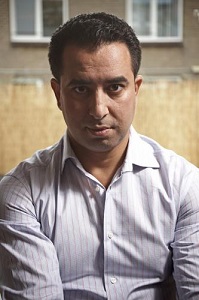
Hans Sahar (Al Hoceima, 24 november 1974)
Zie voor nog meer schrijvers van de 24e november ook mijn vorige blog van vandaag.
